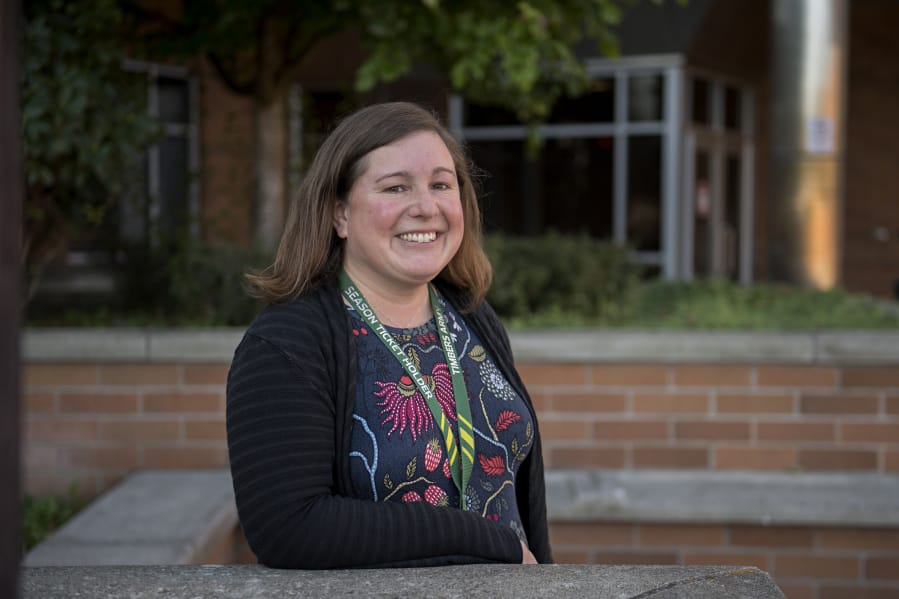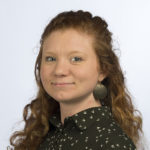Sarah Keirns found her calling while watching an episode of “Sesame Street” “some time in the 1980s.”
The episode engaged children about landfills and garbage.
“I was intrigued by the concept as a child, and it planted the seed. I questioned it,” Keirns, who also inspired by an aunt who was an environmental educator, said.
These days, Keirns, 39, works as an environmental outreach specialist for the Clark County Green Business program. The free program, started in 2011, is an effort by Clark County Public Health’s solid waste and outreach department. Its main function is to certify businesses in six different environmental assessment areas, including waste and recycling, hazardous materials, stormwater, water use, energy, and community and employee engagement.
There are about 90 certified businesses in Clark County, though it has certified more than 100, Keirns said. Some operations have closed or moved out of the county over time.
Pre-pandemic, Keirns, who started working for the county in 2012, would work with companies interested in the certification by going through their facilities, essentially inspecting them.
“Typically, the certification process involves an on-site visit, where we review all of the criteria for the certification program and make sure everything is there,” Keirns said. “That just isn’t possible right now.”
The Columbian caught up with Keirns to learn more and see how the program is adjusting.
What exactly does your job entail?
I work with businesses to complete an assessment, and if the business meets all the criteria, then they become certified. I also provide assistance to businesses in waste reduction and recycling. That can be related to the certification, but doesn’t have to be. Businesses can always ask me about recycling; we give free resources like stickers and recycling boxes. There’s an online form where those can be requested. The other part is hosting events and workshops and opportunities for businesses to learn from each other and speakers on various environmental topics.
This program seems to be relevant mostly when people are working in an office together. With more people working remotely, how has that impacted what you do?
Yes, the program was initially developed to provide a framework for businesses to evaluate their environmental impact. But the program is also open to any and all businesses in Clark County, which currently includes home based-businesses, as well. There has been a significant shift in the pandemic but we’ve been adapting some of our programs and offerings to meet people where they are and still be a good community resource. With recycling resources, I’ve been doing a contactless delivery; I drop off the resources but don’t interact with the person, so that’s an added logistical challenge. New certifications are a challenge, but one thing I have done is recertification. Everyone in the program renews after three years. We’ve been able to do those over the phone and on Zoom.
Is it even possible to do new ones?
I have worked with a couple businesses and I’m eager to work with more. As opposed to calling them certified, I’m maintaining that they’re provisionally certified. Hopefully, once we get to a level of opening to do site visits again, we can call it fully certified. I’m also testing the idea of doing a video site visit, where I work with someone who might have a smartphone or video camera where we can walk through the facility, but remotely. We’ll see how that goes.
How does remote working help in terms of being green?
This was early April, one of the first updates I heard was that businesses that had significantly reduced paper use because of remote work; there wasn’t as much printing happening. At a time when we were really hoping for a positive news story, there it was. I think a lot of organizations have had to make changes, just based on their typical processes with people working remotely. They’ve had to go to more electronic whereas in the past, they needed signatures for things or approvals.
WORKING IN CLARK COUNTY
Working in Clark County, a brief profile of interesting Clark County business owners or a worker in the public, private, or nonprofit sector. Send ideas to Hope Martinez:
hope.martinez@columbian.com; fax 360-735-4598; phone 360-735-4550.
Do you think over time as we become more knowledgeable as a society about recycling, more people will join this program? Have you seen a shift in attitudes?
I have met resistance over some suggestions that I’ve made over time. Change is hard, I think we can admit. The people who are contacting me are wanting to participate in a voluntary program. So they’re eager, even if they aren’t able to implement changes right way, to have those ideas and ways they can make improvements.
Why do you find this program important?
Well every organization can make a difference, whether it’s a small difference in setting up a recycling program for a two-person office or whether it’s a huge manufacturer cutting their energy use. So from a waste and recycling perspective, I exist because it’s my role to educate the business community about our waste and recycling system and help them maximize their efficiency and potential to recycle, which ultimately can help their bottom line. And time and time again, it’s been demonstrated through surveys over the years that employees feel more job satisfaction when their employer is doing the right thing for the environment and engaging with employees.




